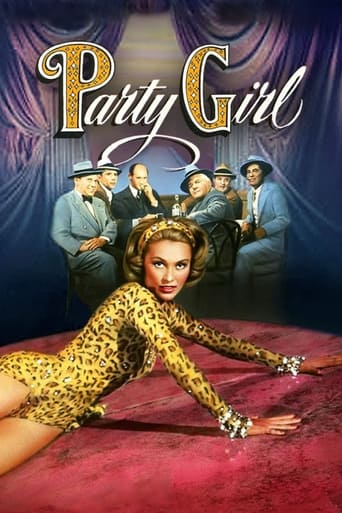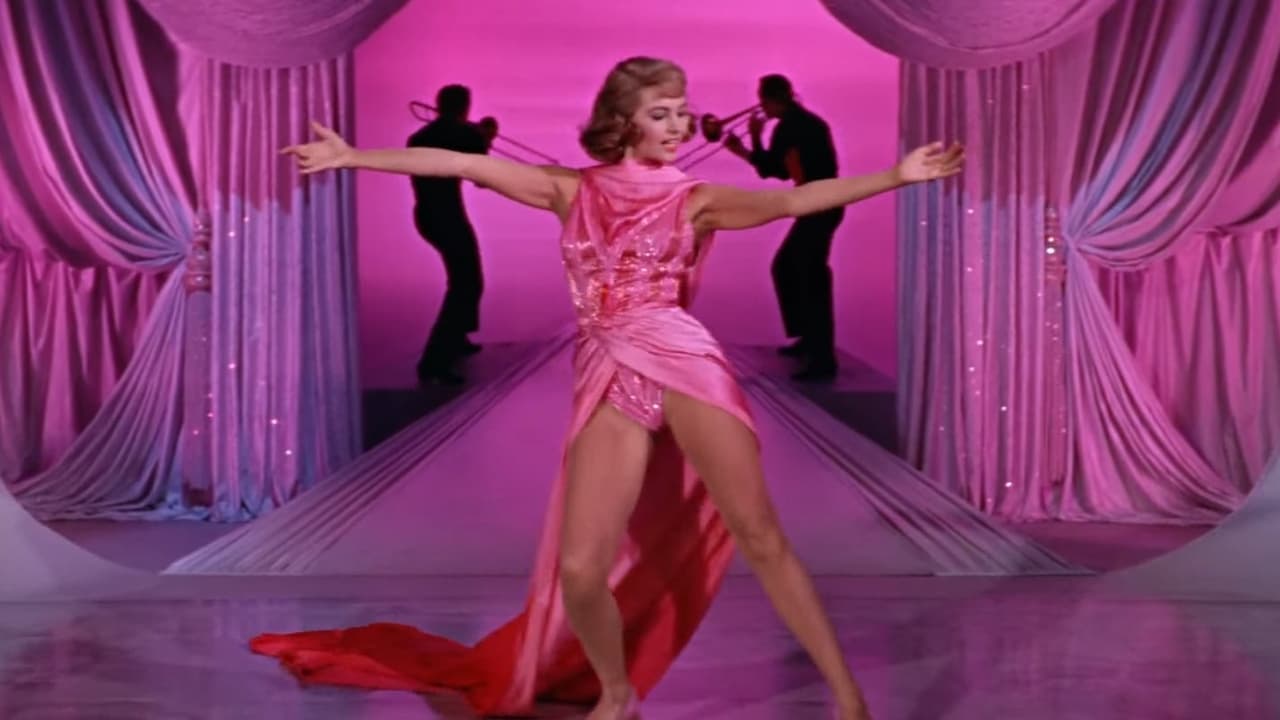LeonLouisRicci
Director Nicholas Ray made, Arguably, His Best Films in the 1948-54 Period. After that, it is a Spotty Output. This MGM, Clueless Picture is Punctuated with a Few Inspired Scenes and Performances.But the Goofy Presentation of Gangsters in the Early Thirties is so Out of Time/Space that the Movie is Failed from Frame One. As far as Labeling this a Film-Noir, well Good Luck with that because only in the Broadest of Definitions could or would this land in the Genre without Strong Disapproval.It's Deep Color and Cinema-Scope, Stagy and Brightly Lit Scenes, Broad Characterizations (why did Ray allow Cobb to Scream his lines half the time), all Presented with that MGM Musical Sheen are some of the Things that Push this Away from the Center of Noir and land it in the Periphery.Robert Taylor Scowls and is Determined to be taken Seriously as a Dramatic Actor, more of a Movie Star for sure, as He reaches Deep for Despair and Nobility. Cyd Charisse lets Her Legs do the Talking most of the Time with Anachronistic Dance Numbers, but does manage to Snap at John Ireland's Lech effectively now and then.Overall, it's a Watchable Misfire because of the Sleek Production but it is Not Great Cinematic Art, it is Commercial Product with an Artificial Soul and an Inauthentic Showpiece with some Scenes that Show the Director's Talent at Work.But most of the Time the Film is Flat, Dull, and Displays its Flaws under Glaring Light and a Vibrant Color Scheme.
edwagreen
Nice to see that David Opatoshu and Lee J. Cobb were in this film. 2 years later they would star as brothers on a different path in the wonderful "Exodus."Eleven years before, Kent Smith and John Ireland both gave wonderful support in the winning "All the King's Men." In this one, Ireland is a hard-nosed gangster under Cobb's thumb and Smith is a prosecuting attorney, very much different from his usual bland roles.The film stars Robert Taylor and Syd Charisse as two people caught up with gangster Rico, Cobb. Taylor is his mouth piece and Charisse, the dancer with whom Taylor links up and they eventually try to rid themselves of Rico, but are caught up by threats, intimidation and general violence, conducive for the 1930s Chicago setting.It's basically the old story of trying to reform and start anew, and it is done quite well.
MartinHafer
It's interesting that Robert Taylor's last film under his long MGM contract ended so well with this tough little movie. While "Party Girl" is filmed in color and lacks the gritty dark look and unusual film angles of film noir, it is a nice near-noir film. Taylor plays an attorney with no soul. He has spent his career working for the mob and doesn't mind working for scum--as it pays very well! However, when Taylor meets a dancing girl who turns out to be quite decent (Cyd Charisse), his amoral attitude is shaken and he wants to leave his lucrative practice and do something decent with his life. What makes this film is the excellent supporting cast working with Taylor (who, by the way, is quite good here). Lee J. Cobb is wonderful as the Al Capone-like mob boss and his henchmen (John Ireland, David Opatashu and Corey Allen) are all exceptional actors. Together, combined with a wonderful script and exceptional direction, it makes for a very good film indeed. Tough, cynical and a quality production throughout, this is a great swansong to his MGM career. The only deficits are the dancing numbers by Charisse and a mistake in the final scene where acid pours on Cobb's face but he's not the least bit burned. The dancing just wasn't necessary and tended to disrupt the dark tone of the film. By the way, if you like this film, try also watching John Garfield in "Force of Evil". Its plot is very similar and is also an exceptional film.
artihcus022
''Party Girl'', Ray's final film for a major Hollywood studio(after this he worked with independent producers) is a highly baroque work. Screechingly mannerist in places, occasional head-first dives into camp but also remarkable instances of poetry and subtlety and a highly charged social portrait. It is a very discordant work which is to say that it deliberately skewers audiences expectations of a genre film by working as a genre film but stylized in a manner that the clichés and conventions look highly abstract, not unlike a film by Douglas Sirk.''Party Girl'' is shot in CinemaScope and Metrocolor, is produced by Joe Pasternak who was in charge of the second-tier MGM unit. The Leonine studio had by the mid-50's devolved into an organization of penny-pinchers and according to Ray, the only reason this film got made was because it's backers wanted to get rid of it's two stars...Cyd Charisse and Robert Taylor so as to exhaust their run of contracted films as quickly as possible. This explains the fact that more than ''Johnny Guitar''(with it's superlative cast of actors), ''Party Girl'' is the closest Ray came to make a B-Film. The storyline is a standard-issue crime drama and it is by a safe distance the most generic of Ray's major films.That it's still a major film is for me little doubt. Though lacking the strength of his early crime films and his 50's melodramas, ''Party Girl'' is still a deeply compelling film about the universality of compromises in society. The title ''Party Girl'' is essentially a slang for prostitute or for being under someone else's thumb. It refers to Cyd Charisse's character Vicki Gaye, a showgirl who works part-time as escort to various underworld types alongside other gals who work at the ''Rooster Folliers''(no joke). But it also includes mob lawyer Tommy Farrel(Robert Taylor) and applies to everyone else.Ray's distaste for plot apparent in all his films is full in abundance here as the generic outline of this story of crooked lawyer turned straight through the power of love takes on several asides. Like the one-scene appearance of a fellow showgirl who's waiting for her man and whose depression, Vicki stifles as a result of habit and accord over the years. The scene where she walks into her roommate's bathroom and finds her swimming literally in a pool of her own blood in a bath-tub is one of Ray's most embedded images even if(in accord with then censorship) the image lasts only a few micro-seconds before a quick fade-away. Much of the secondary section of the film centers on Tommy's relationship with Rico Angelo(Lee J. Cobb in a towering performance) and there's very little plot driving their very powerful scenes. Tension arises from flaming egos by a mob underling played by John Ireland over Tommy's relationship with Vicki.The film's sense of decor and colour is what we'd call now Fassbinderesque. It's pictorially fascinating and the colours are very eye-catching but the underlying design behind it is a sense of decadence of vulgarity. This reflects perhaps that the underlying subtext of this film is less about gangsters than about Hollywood. With Lee J. Cobb's mix of charisma(like Vito Corleone in ''The Godfather'') and crass vulgarity(like Joe Pesci in his films with Scorsese) stand-in for many studio heads of that period and the two musical interludes(numbers is the wrong word for it) by Cyd Charisse while visually striking is poorly choreographed and seems like a parody of the dying MGM Musicals.''Party Girl'' is a reflection ultimately of what are the results when a great artist and a few good actors are working with conventional plots can achieve. It's a work that's of it's own kind. Not a gangster film entirely, mostly a Film Noir though in colours, visually creative but mostly functional. The decor of the film makes it's genre trappings apparent and obvious revealing and critiquing it's functions yet the scenes between Taylor and Charisse are very much played straight conveying genuine compassion between two characters who have long lost their innocence and are merely doing their best to survive and find a semblance of happiness, a happiness that's threatened not only by the mob but also by the cops who want to use them to catch the bad guys(which has much benefits for their own political careers).What may put off most fans of Nicholas Ray is the graphic violence of the film which is quite unexpected and strong for a film of the 50's. Plenty of bloodletting is on display on this film...of course Ray would say "that's not blood...that's red."



 AD
AD





